This easy recipe for Orange Peel Vinegar calls for just 2 simple ingredients, and is the perfect way to avoid waste when you have extra orange peels laying around.
This recipe can be made with just about any citrus fruit, but orange is particularly good at getting up sticky stuff and making things shine.
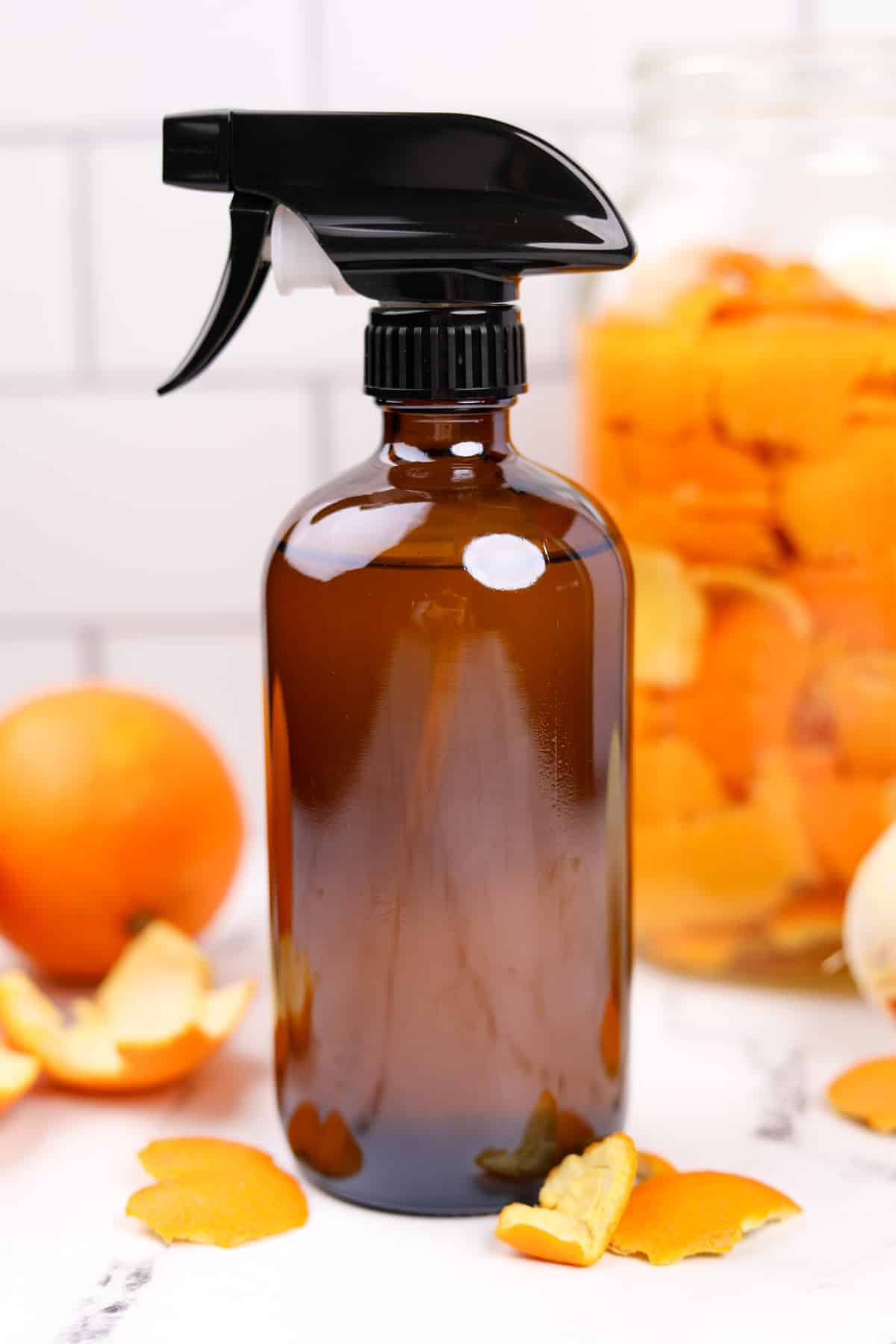
Jump to:
If you've recently completed a product involving a lot of oranges (like canning oranges or making your own juice), you're probably wondering what you can do with all of those leftover peels.
Here's one for you: orange peel vinegar.
This zero waste project is the perfect way to recycle your leftover peels into a powerful, all-natural cleaner.
This orange vinegar cleaner has been in constant rotation in my home, and I love it for cleaning furniture, countertops, and more. I always keep a spray bottle by the sink, and you will too once you start using it!
It smells great, is all natural, and super cheap. What's not to love?
Why Orange Vinegar?
- The peels of oranges contain natural oils, one of which is D-limonene, which is a common addition to commercial cleaning products.
- Orange essential oil is commonly used for removing sticky substances, or adding de-greasing powder to your favorite natural cleaner.
- It's a great way to avoid waste. Why throw out the peels when you can use them to make your own orange peel vinegar cleaner?
- No extra cost. Chances are you have some vinegar laying around, so all you need is a clean spray bottle and you're good to go.
Ingredients
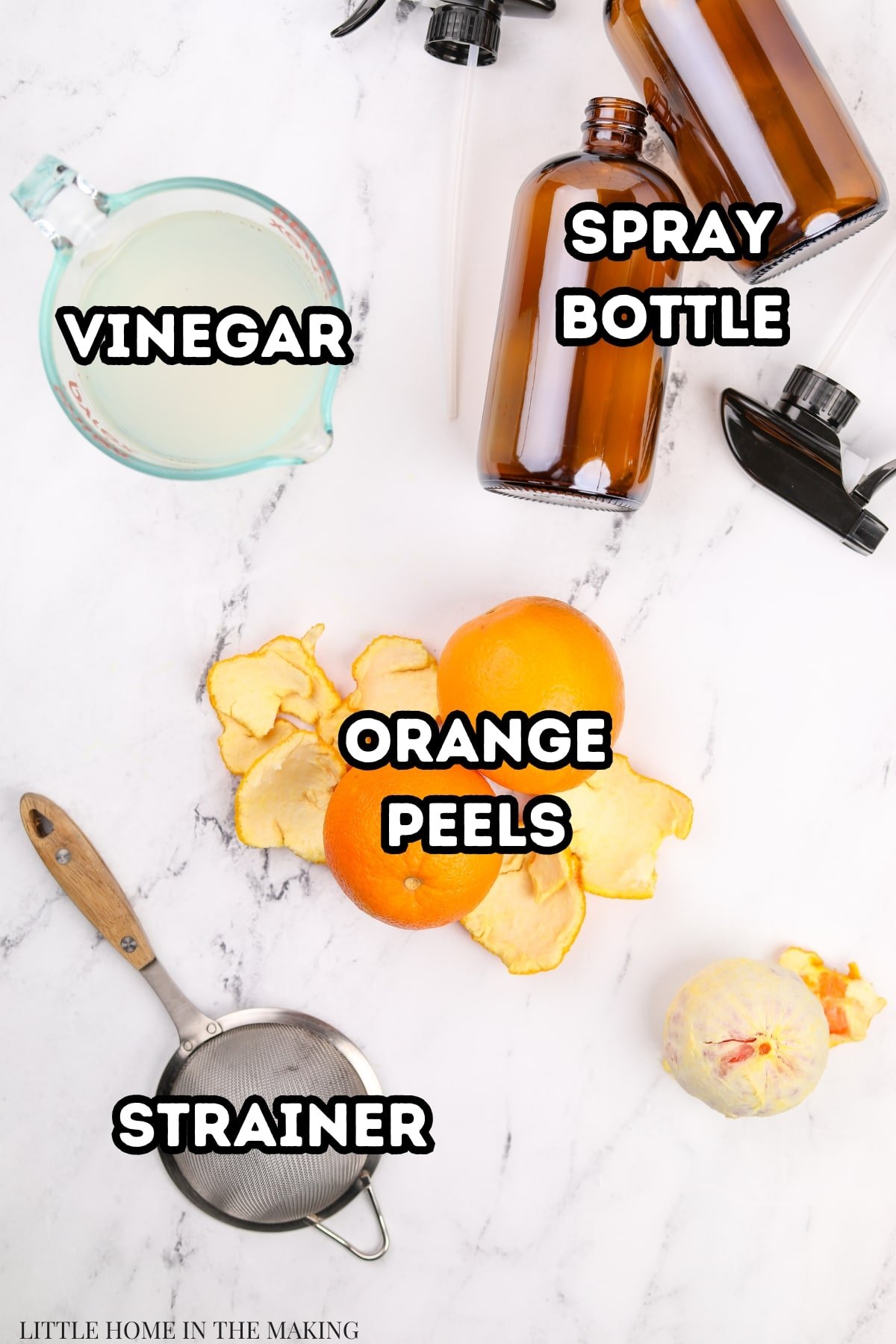
- Orange peels: You can really use any citrus peels, but orange peels are my favorite. They smell great, and the essential oils from the peel act as a natural de-greaser.
- Vinegar: I recommend a regular white vinegar with 5% (or higher) acidity. This is the standard vinegar that is sold in most grocery stores.
Equipment
- Glass jar and lid: Use whatever size you need to fit the amount of leftover orange peels you would like to use.
- Strainer: Use one with small enough holes that it won't allow tiny pieces through. I went for a stainless steel fine mesh strainer.
- Small funnel: I have a set of small stainless steel funnels for making homemade vinegars, kombucha, etc.
- Spray bottle: If you want to use this as an all-purpose cleaner, I recommend transferring the liquid to a spray bottle. I use an amber-colored glass spray bottle.
How to Make Orange Vinegar
It's SO easy to make your own homemade orange peel cleaner. The orange oil acts as a natural solvent and has serious cleaning power!
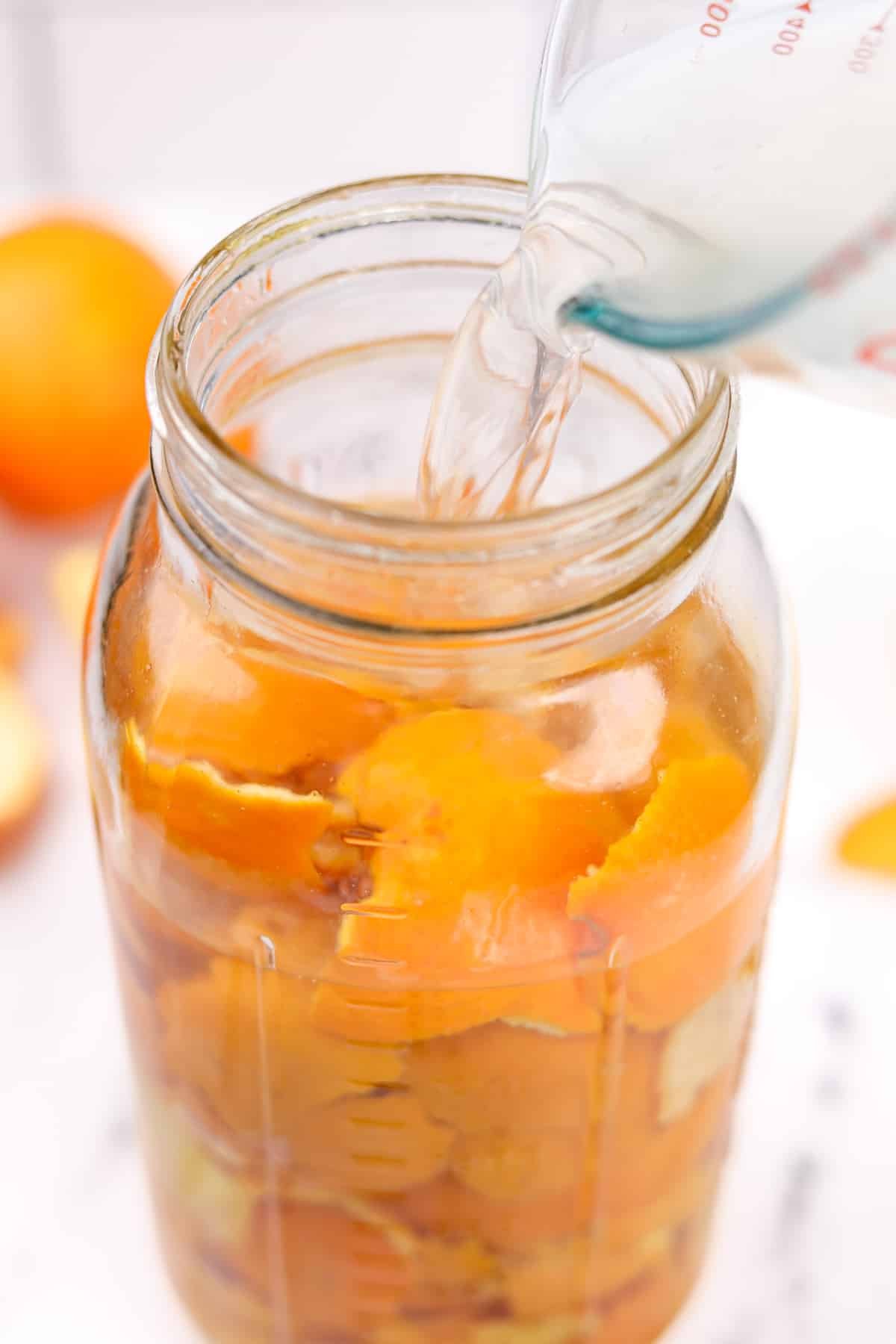
Step one: Lightly pack your orange peels into a glass jar that's big enough to hold them (a pint-sized jar for smaller batches, and a half-gallon for large ones).
Step two: Pour vinegar in the jar, adding enough to cover the peels by 1-2". Remove any air bubbles, then top up with additional vinegar (if needed).
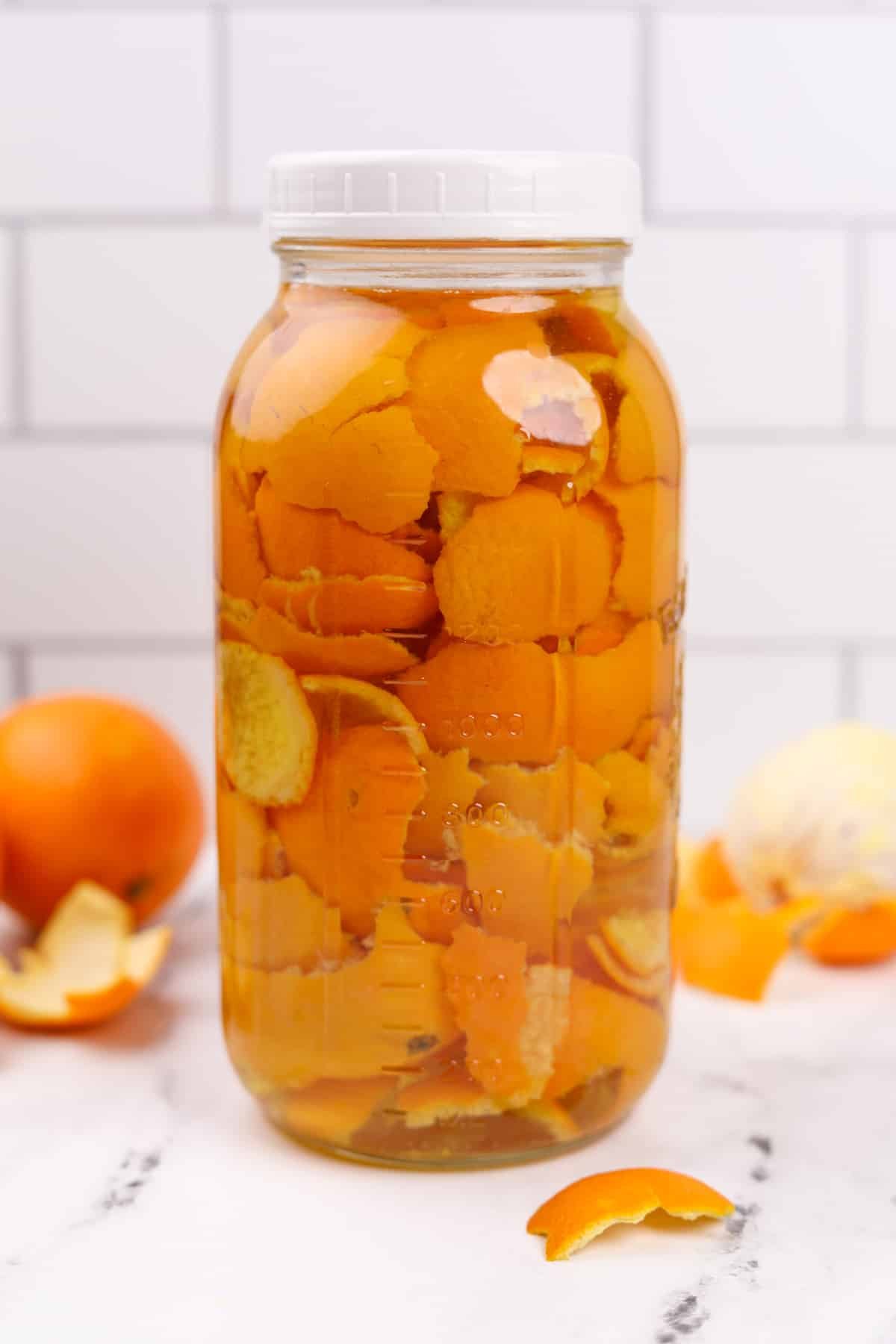
Step three: Add a lid to the jar and place the jar in a warm spot on your kitchen counter (or in a dark place like a cupboard or pantry).
Steep for 14-28 days, or until the liquid has turned slightly orange.
How long should I steep my citrus vinegar?
You will know that your orange vinegar is finished when you see an oily layer rising to the top, and the vinegar has turned orange. I like to leave mine for up to 4 weeks, but it definitely can be used within 2 weeks.
The higher the peel to vinegar ratio, the more fragrant the vinegar will be.
Straining the Infused Vinegar

Step four: Fit a large measuring cup or bowl with a fine strainer. Pour the infused mixture through.
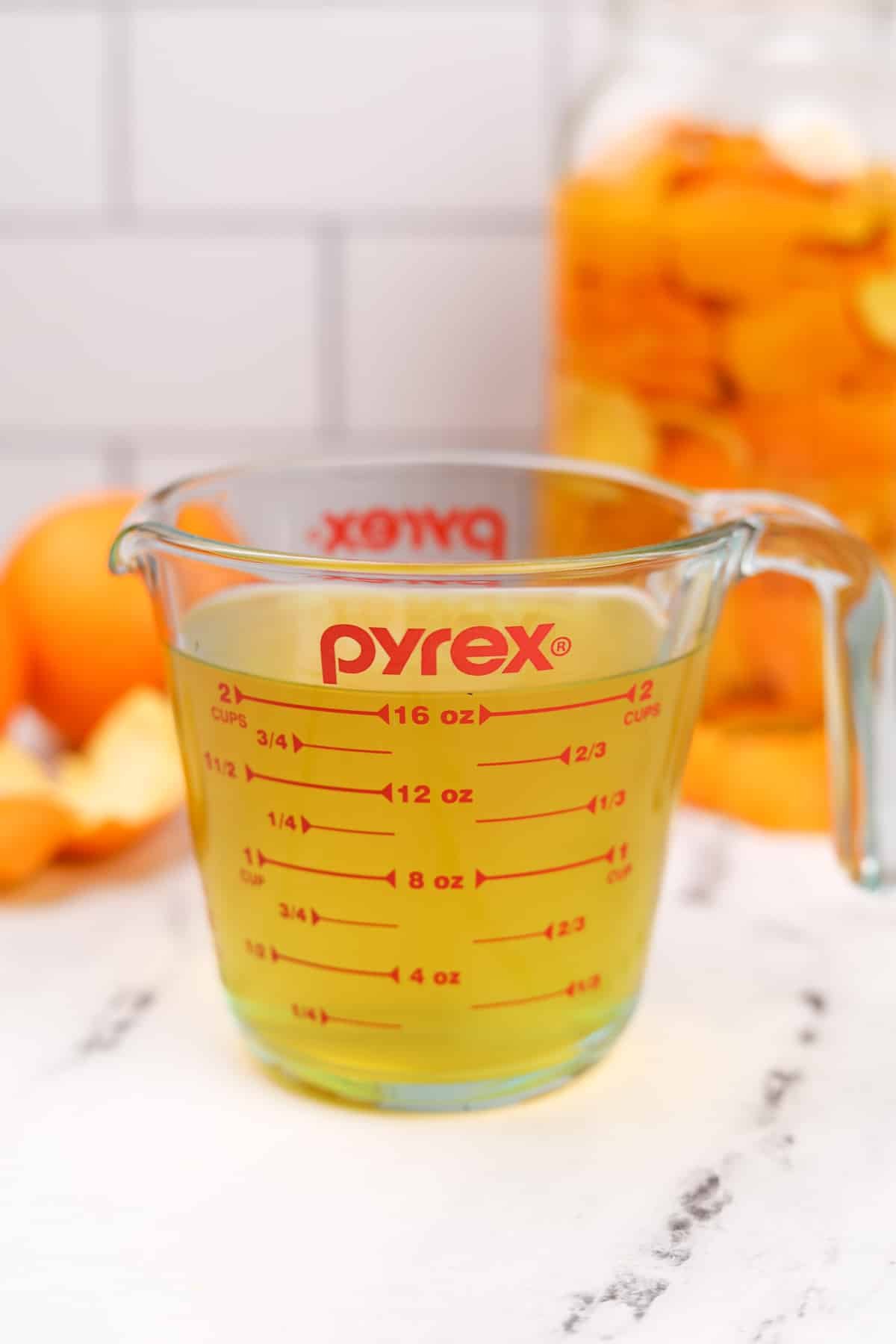
Step five: Discard the peels (or compost them in a Bokashi bucket) and reserve the liquid.
Note: If you have a garbage disposal, don't put a large amount of peels in there at once - it can cause clogs.
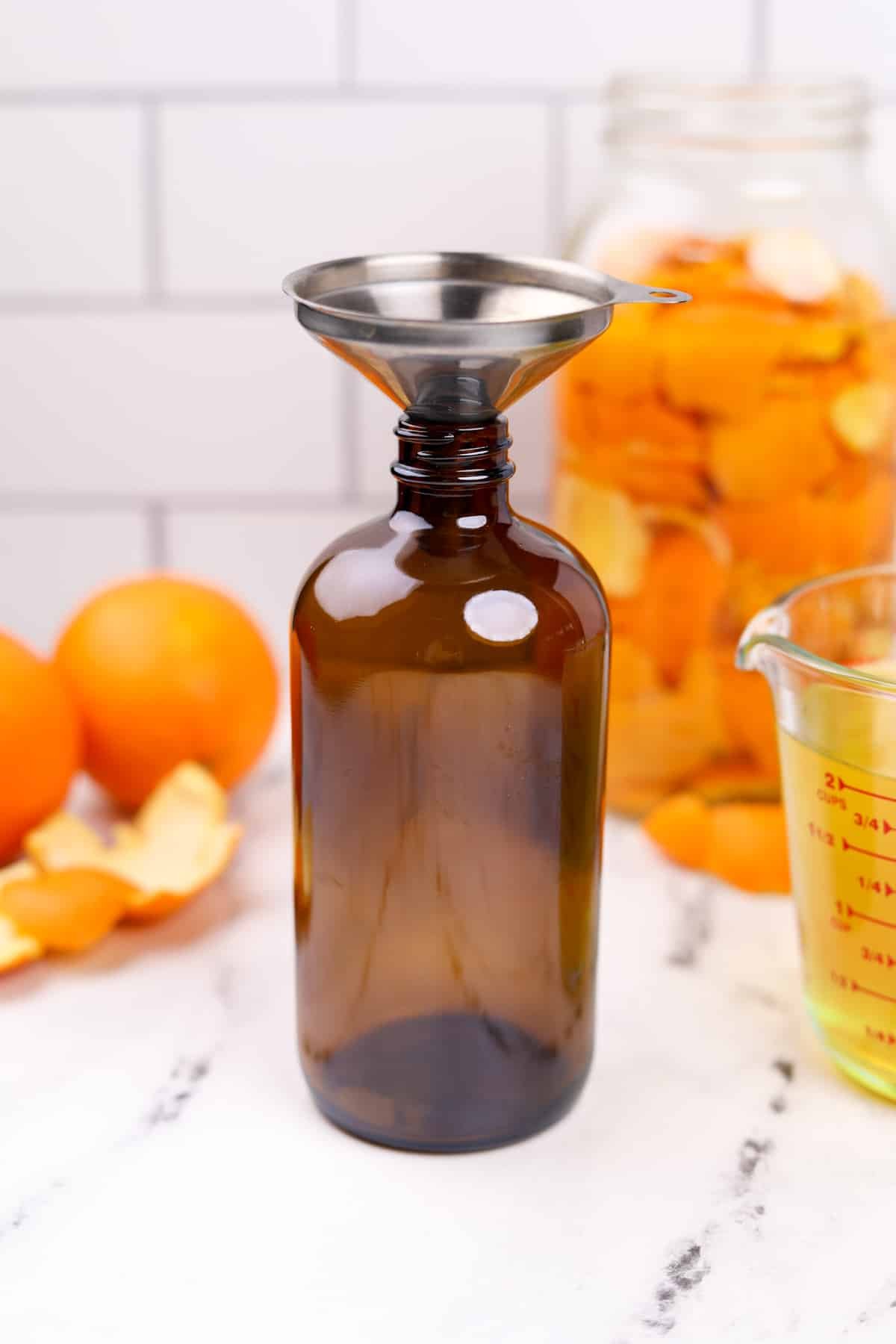
Step six: Fit a spray bottle (OR quart jar or glass bottle) with a funnel.
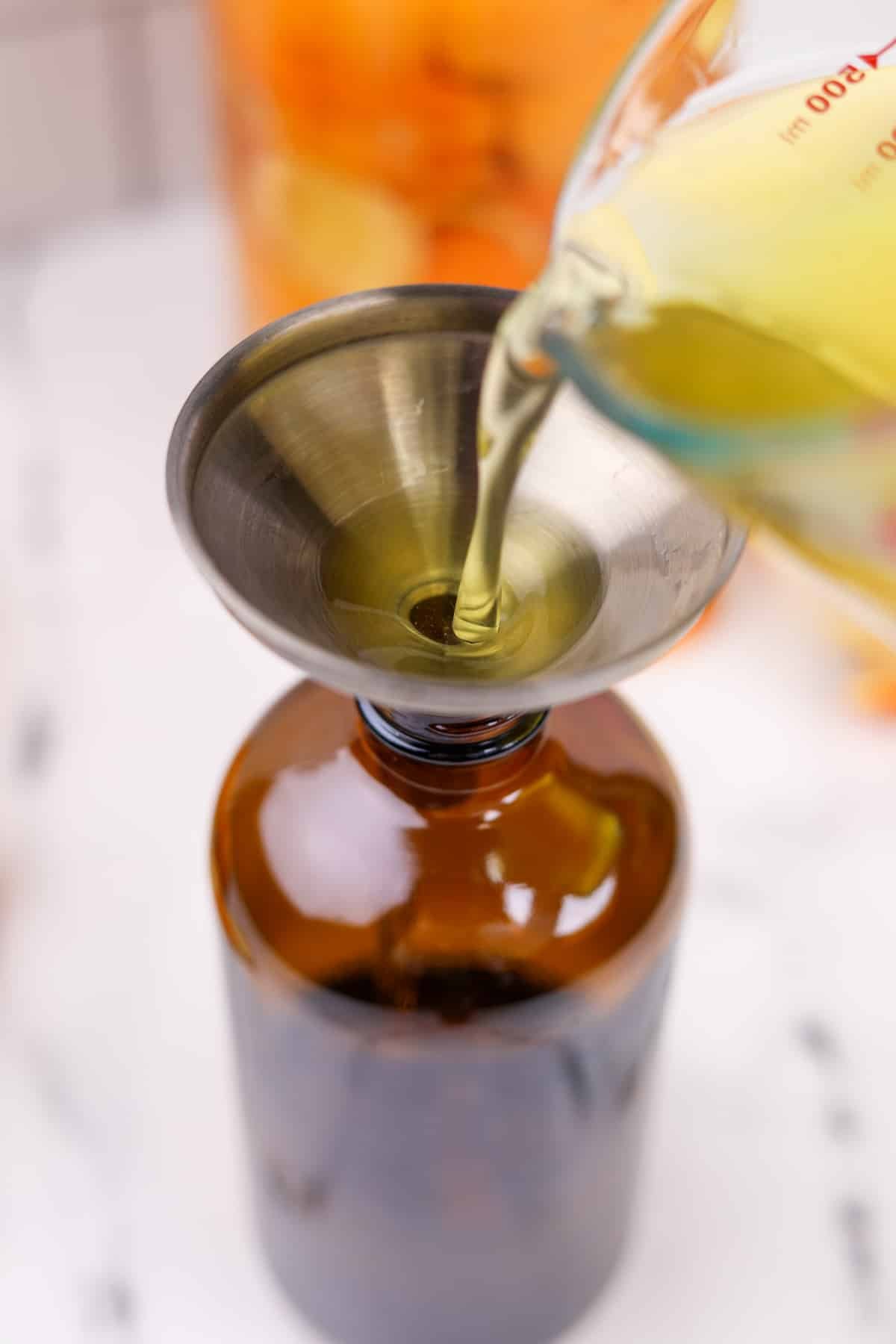
Step seven: Pour the orange vinegar through the funnel, filling the spray bottle to within 1" from the top.
Secure the lid, and label for easy identification.
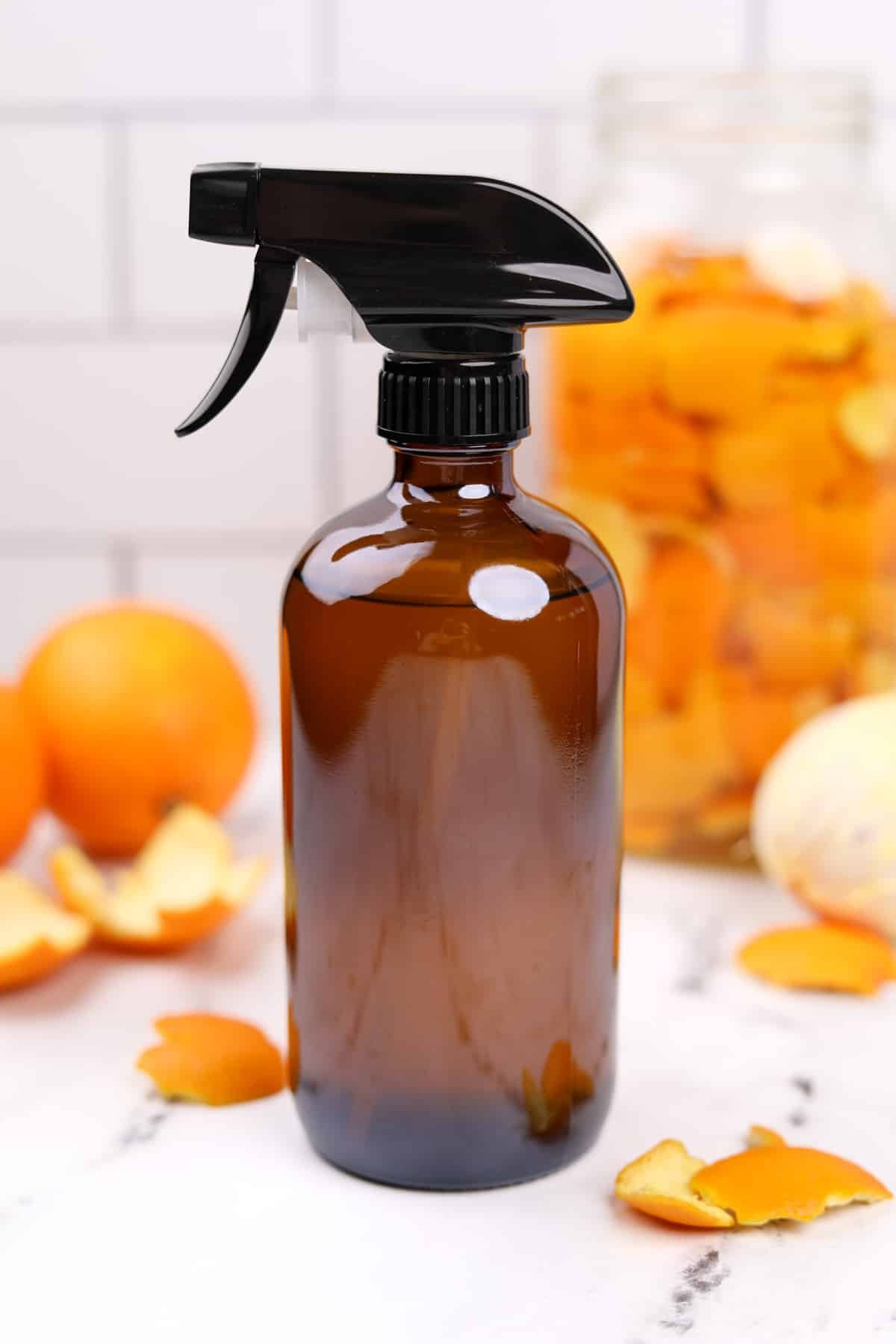
Ways to Use Orange Vinegar
- All purpose cleaner
- Combine with Castile soap for a great de-greaser
- Removing soap scum
- Diluted and used as a floor cleaner (don't use on wood or waxed laminate floors)
- As a hair rinse (use 1 tablespoon of vinegar for every 1 cup of water)
FAQs
Vinegar - even diluted - should not be used on hardwood floors. The acetic acid can etch the surface, creating an uneven appearance and slowly wearing away at any finishing products used.
Yes, you can use either apple cider vinegar or homemade vinegar for cleaning. Take note that the apple scent and color may compete with any citrus peels, so it may have a strange color or scent - it still should clean just fine though!
I would not recommend using orange vinegar for cooking or adding to foods. Most oranges are sprayed heavily, and the peel holds onto those pesticides and herbicides. For that reason, it's recommended to use it only for cleaning or external applications.
Since orange is so fragrant, the smell of vinegar isn't as overwhelming as it would be if you were using plain white vinegar. I find the smell pretty mild.
Yes. Since you'll be using a very acidic liquid (vinegar), it's best to use glass since the mixture will be steeping for 2+ weeks. This prevents breakdown of the container, and potential leaching.
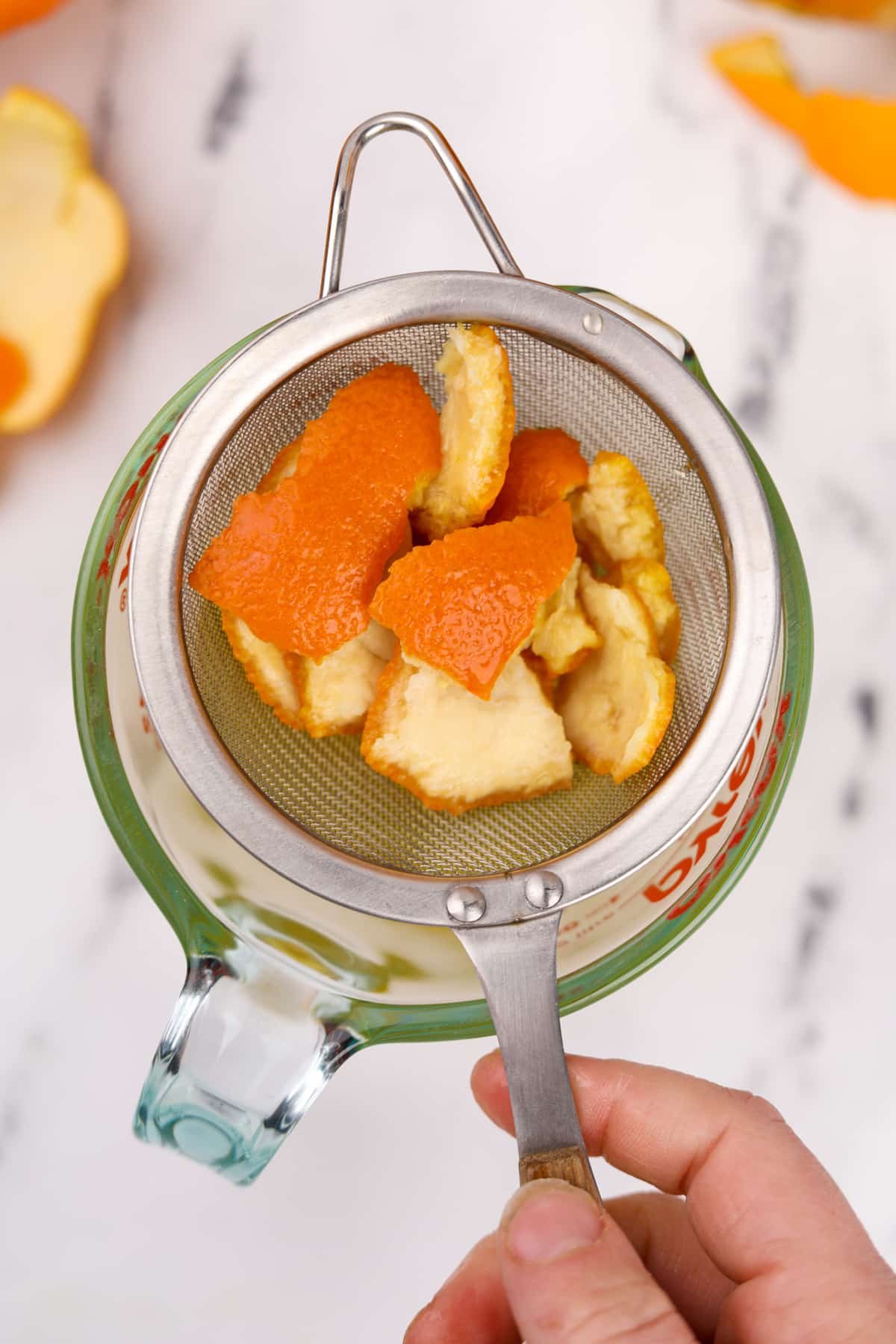
Variations
You can make this easy infused vinegar with the peels of pretty much all of the citrus fruits (like lemon peels or grapefruit peels)! They all have different properties, but generally will work interchangeably.
- Lemon
- Grapefruit
- Lime
- Mandarin, tangerine, or clementine
- Citron
- Etc.
More Ways to Use Citrus
If you loved this orange peel vinegar recipe, let me know by leaving a 5-star review in the recipe card or comment below! You can also tag me on Instagram @littlehomeinthemaking.
📖 Recipe
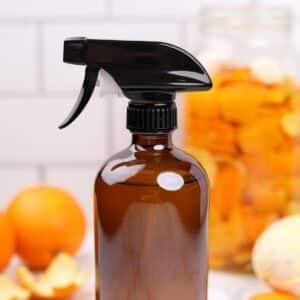
Orange Peel Vinegar
Equipment
- Glass jar and lid
Ingredients
- Orange peels
- White vinegar
Instructions
- Pack your orange peels loosely in a glass jar big enough to hold them.
- Pour in enough white vinegar to cover the peels by 1-2”.
- Use a butter knife to remove any air bubbles that have formed, then top off the vinegar if needed.
- Add a tight lid and place the jar in a warm spot in your kitchen for 14-28 days to steep.
- Once the vinegar has been infused with the orange peels, you should notice a slightly orange color and a bit of oil floating at the surface.
- Fit a large bowl with a fine mesh strainer and pour the orange peels and vinegar through it. The infused vinegar will collect below, and the peels will catch in the strainer.
- Transfer the orange vinegar to a spray bottle, or a clean glass jar with a lid.
- Use as an all-purpose cleaner and degreaser where needed.
Notes
Please note that some of my blog posts here at Little Home in the Making may contain affiliate links. If you make a purchase through these links, I will get a small commission at no additional cost to you. See our disclaimer for more information.


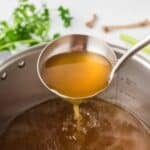

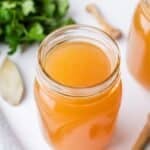

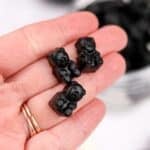

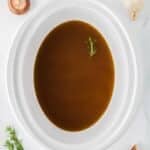
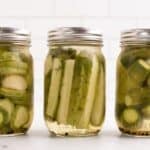
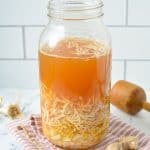

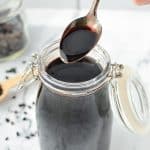



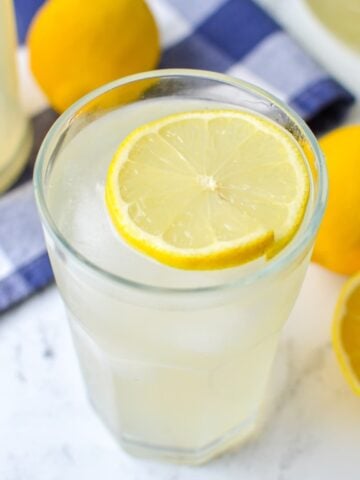
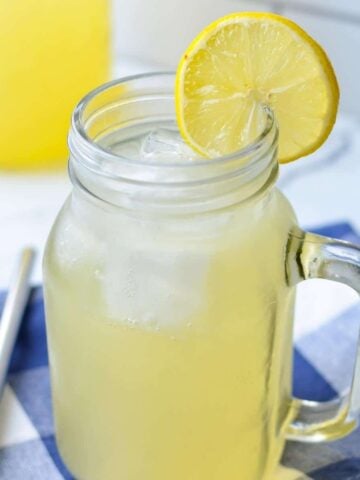
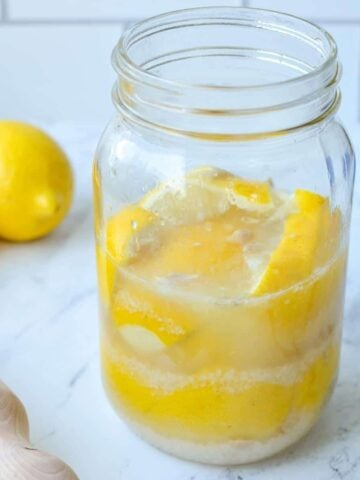
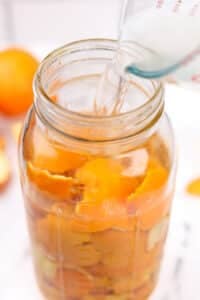
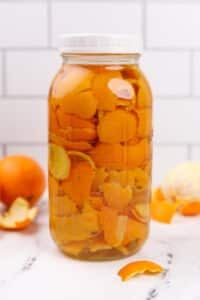
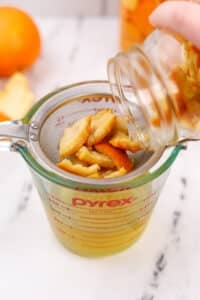
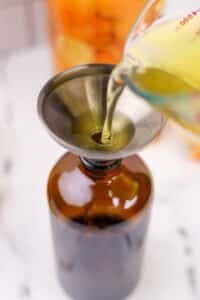
Elizabeth
Great idea.
If your oranges are from your garden and are pesticide free, I imagine it would be ok to use the vinegar in cooking.
Dolly | Little Home in the Making
Yes probably! I haven't tasted it myself to know, but it might be a little bit bitter because of the inclusion of the pith.